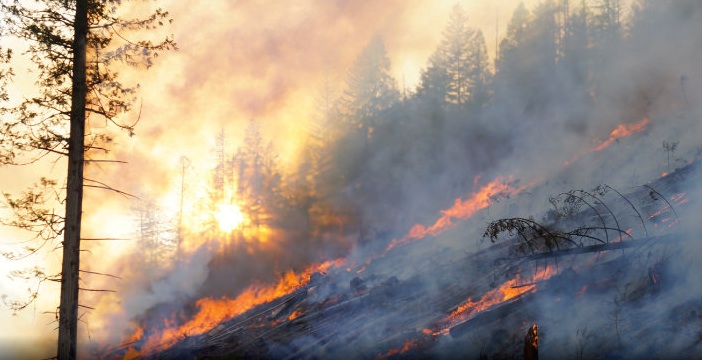Apparently Alberta and British Columbia exist on different planets.
Literally, I mean. Not metaphorically.
How else are we to explain the political discourse among, essentially, the same people in geographically contiguous landmasses experiencing the same climatological phenomenon?
That is to wonder, why are you allowed to state one obvious conclusion when B.C. is afire, but not when Alberta is burning?
Let’s call these two astronomical bodies Planet A (for Alberta) and Planet B (for B.C.).
This summer, as alert followers of the news are bound to have noticed even if they haven’t been outside to sniff the air, much of Planet B is on fire. But commentators on that planet have no problem considering the possibility global climate change may have something to do with this unhappy situation.
No one screamed bloody murder or treason, for example, when the CBC asked if global climate change might mean that dangerous fires like those in B.C. have become “the new normal” and can be expected to threaten people and their homes every summer in Western Canada.
Mind you, departing B.C. Premier Christy Clark said the same thing in the same words about the same problem back in 2015, at the same time as fire experts from the University of British Columbia Forestry Faculty and the B.C. Forest Service were making similar observations. So there’s really not much new or controversial about such conclusions — which will presumably make it easier for B.C. NDP Leader John Horgan to say the same sort of thing when he’s sworn in as premier next week.
Not everyone agrees with this proposition, of course, but apparently on Planet B it is a question that can be asked without anyone suggesting the questioner is attacking the residents affected by fire. Likewise, no one appears to be arguing vociferously on that planet that the middle of a fire crisis is no time to talk about the cause of the crisis. On the contrary, now is evidently seen as a fine time for everyone to be asking the same obvious questions.
By comparison, when Planet A was afire in May last year, this was precisely the line taken by that planet’s “conservatives” — many of whom are market-fundamentalist, extremists who view carbon extraction as not just a right, but a duty — about any such line of discourse.
In short order, as a result, discussion of the conditions that caused the fire known last year as “The Beast,” which threatened all of the oilsands service city of Fort McMurray and damaged a significant portion of it, was almost completely proscribed on Planet A.
In other words, discussion of climate change in the face of serious impacts that could easily be attributed to climate change was successfully declared to be politically incorrect by the political right, notwithstanding their ironically and loudly claimed opposition to political correctness. Anyone who dared to state the obvious was immediately declared to be politically persona non grata. “Anthropogenic” became a four-letter word.
Consider Elizabeth May, leader of the Green Party of Canada and its sole member of Parliament. She was roundly excoriated for daring to connect these rather obvious dots. A drivelist for the National Post called her as a result an “excessive climate zealot,” and that was one of the nicer things said about her. The tone of social media was considerably nastier. And the people at Rebel Media, who frequently scrape the bottom of the rhetorical barrel, called her a “drunken cat lady.”
And yet — and here’s the thing — in the alternative universe that is political discourse in Alberta, these same Planet A conservatives have had nothing at all to say about the discussion on Planet B openly including commentary this is forbidden here on Planet A, even among the planetary leadership led by NDP Premier Rachel Notley.
Two conclusions are possible from this.
Conclusion No. 1: that Alberta and British Columbia really are on different planets, and possibly in different universes as well.
Conclusion No. 2: that, never mind the casual evidence, the allegation discussion of the environmental impacts of climate change was somehow hurtful or inappropriate in the wake of the Fort McMurray wildfire was used to suppress needed discourse that went against the conservative narrative about the future of Alberta, the province’s economic needs and wants, and the causes of the problems the province faces.
In particular, it is said here, it was used to silence people who might express doubts about the Alberta case for pipelines through British Columbia or other parts of Canada in light of practical evidence of the effect of climate change.
This strategy seems to have worked, at least with politicians from all the major parties that aren’t overtly hostile or dismissive to environmental concerns. At any rate, they mostly cautiously refrained from making any links between climate change and the 2016 Alberta fire — or even commenting on May’s observation.
If this were not the case, one would think, these same conservatives from Planet A, that is to say Alberta, would now be making the same arguments against the discussion that is considered quite normal and respectable on the planet next door. Instead, we hear crickets, or at least something akin to the Music of the Spheres.
Likewise, this suggests the principal users of the political correctness weapon to disrupt political discourse on Planet A are conservatives.
You decide what’s actually going on.
This post also appears on David Climenhaga’s blog, AlbertaPolitics.ca.
Like this article? Please chip in to keep stories like these coming.





